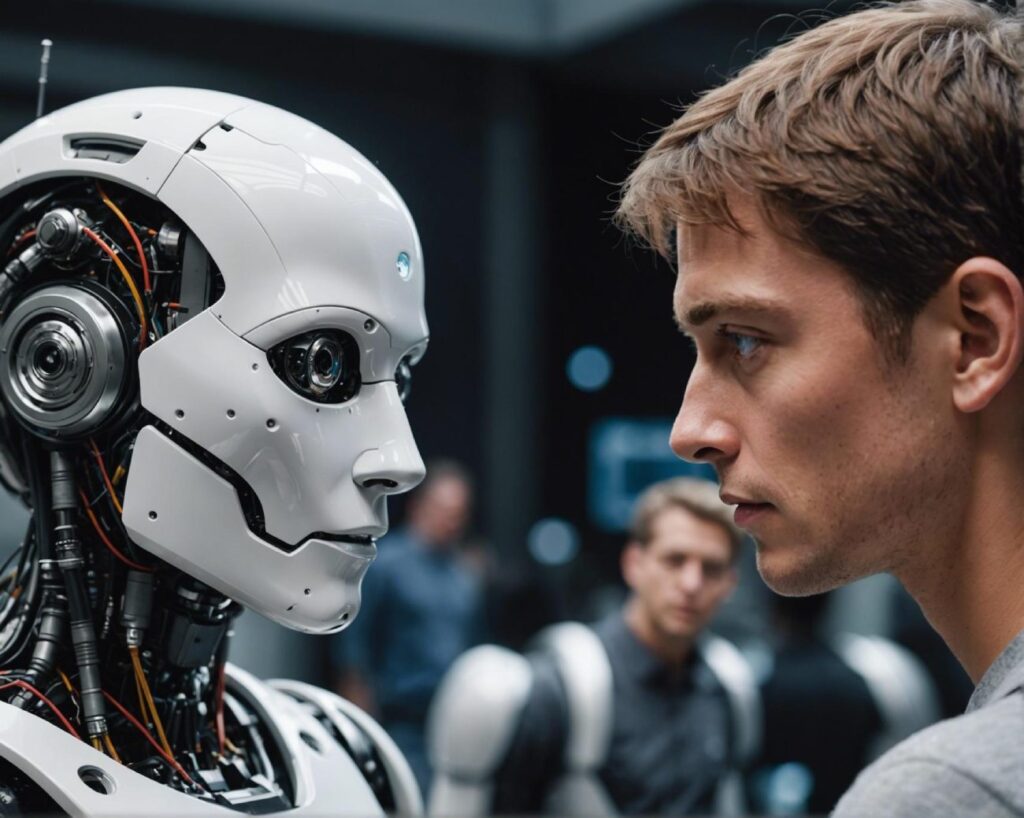The debate between AI-generated content and human-written content has intensified in 2024.
Everyone is trying to understand which method better supports search engine rankings, drives traffic, and in the end, makes more money.
Recent research and experiments have shed light on the strengths and weaknesses of both approaches, suggesting that while AI can streamline content creation, the human touch remains irreplaceable for achieving top SERP positions and engaging readers at a deeper level.
[blog_key_takeaways]
What is AI Content
AI content refers to text generated by artificial intelligence algorithms, designed to mimic human writing styles.
These algorithms analyze big datasets to produce content on a wide range of topics, aiming for coherence, relevance, and engagement.
Unlike human writers who draw from personal experience and creativity, AI tools rely on pre-existing information and patterns in data to create new content. Basically, they predict the next word.
This process allows for rapid content generation, making AI a valuable asset for producing large volumes of material.
However, AI-generated content often lacks the nuanced understanding and emotional depth that human writers bring to their work, which can be crucial for connecting with readers.
What does Google say about AI content?
Google’s stance on AI-generated content emphasizes adherence to its E-E-A-T guidelines, which prioritize expertise, authoritativeness, trustworthiness, and quality.
The search engine giant does not inherently discriminate against content produced by AI, provided it meets these quality standards.
Google encourages content creators to focus on the value and helpfulness of the content to users, regardless of whether it is generated by humans or AI.
This approach underscores the importance of content quality over the method of creation, suggesting that AI-generated content can rank well if it is informative, accurate, and aligns with user intent.
Google’s guidelines advocate for a balanced use of AI in content creation, ensuring that it serves to enhance, rather than replace, the human element in crafting valuable and engaging content for readers.
The Battle of Content: AI vs. Human
The competition between AI-generated and human-written content centers on their effectiveness in SEO.
Studies reveal that while AI can produce content rapidly, it often lacks the depth and emotional engagement found in human-written articles.
Marketing Agency St. Louis and NP Digital’s research illustrates that human content excels in SERP rankings and attracts more traffic, underlining the critical role of human creativity and expertise in SEO success.
Neil Patel’s findings support this, showing a preference for human articles in attracting visitors, emphasizing quality’s importance over quantity.
An experiment comparing different content types suggested that although AI can assist in content creation, human oversight is essential for maintaining quality and relevance.
The Unmatched Value of Human Touch in Content
Human-written content stands out for its ability to connect deeply with readers, offering nuanced understanding and emotional resonance that AI struggles to replicate.
The studies highlighted indicate that human content not only performs better in search engine rankings but also in engaging the audience effectively.
This engagement is crucial for SEO, as it increases dwell time and encourages interaction.
The human touch in content creation brings a level of authenticity and creativity that AI-generated material currently cannot match, making it invaluable for brands aiming to build genuine connections with their audience.
Hybrid Approach: Combining the Best of Both Worlds
The hybrid approach to content creation represents a strategic fusion of AI efficiency and human creativity.
This method leverages the rapid content generation capabilities of AI while ensuring the depth, context, and emotional resonance that only human writers can provide.
By combining these strengths, content creators can produce high-quality, engaging material that satisfies both SEO requirements and reader preferences.
The hybrid model offers a pragmatic solution to the challenges of scale and personalization in content marketing, enabling brands to maintain a high volume of content without compromising on quality.
Strategies for Integrating AI with Human Expertise
To effectively integrate AI with human expertise, content teams should adopt a collaborative workflow that capitalizes on the strengths of each.
Initially, AI tools can be used to generate content drafts, conduct research, and suggest topics based on trending data.
Human writers then refine these drafts, infusing them with personal insights, emotional depth, and creative flair. This process includes:
- Editing and Revising: Human editors enhance AI-generated drafts for clarity, tone, and style, ensuring the content resonates with the target audience.
- Fact-Checking: Writers verify the accuracy of information provided by AI, correcting any inaccuracies or outdated data.
- Adding Personal Touch: Humans add anecdotes, examples, and personal experiences that AI cannot replicate, enriching the content’s appeal.
This collaborative model ensures that the final content is both efficient to produce and deeply engaging, meeting the high standards of today’s digital landscape.
Google’s E-E-A-T Guidelines and Hybrid Content Creation
Google’s E-E-A-T guidelines underscore the importance of expertise, authoritativeness, trustworthiness, and quality in content creation.
The hybrid approach aligns perfectly with these standards by combining AI’s ability to process and organize information with human expertise and credibility.
Content that reflects a deep understanding of the subject matter is presented in an authoritative and trustworthy manner, is more likely to rank well in search results.
By leveraging AI for preliminary research and drafting, and applying human expertise for insights and polish, content creators can produce material that excels in E-E-A-T criteria.
This synergy not only enhances SEO performance but also builds reader trust and engagement, key factors in the long-term success of digital content strategies.
The Future of SEO: Symbiosis Between AI and Human Creativity
The evolving SEO landscape is increasingly recognizing the value of a symbiotic relationship between AI and human creativity.
This partnership is poised to redefine content creation, blending AI’s computational power with human insight to produce content that is both scalable and deeply engaging.
As search engines become more sophisticated, the ability to generate content that resonates on a human level while meeting technical SEO standards becomes crucial.
This synergy promises to elevate SEO strategies, making them more effective in reaching and impacting target audiences.
Leveraging AI Efficiency with Human Creativity
To maximize the potential of content in SEO, leveraging AI for its efficiency and humans for their creativity is becoming a best practice.
AI excels in analyzing data, identifying trends, and generating content at scale.
When this capability is combined with human creativity, which introduces originality, emotional depth, and cultural nuance, the content becomes more compelling and valuable to readers.
This approach not only enhances the quality of the content but also its relevance and appeal, factors that are critical for SEO success.
By integrating AI’s analytical strengths with human creativity, brands can produce content that is both optimized for search engines and deeply resonant with readers.
Best Practices for a Collaborative Content Creation Process
For a collaborative content creation process to be effective, several best practices should be followed:
- Define Clear Roles: Establish clear roles for AI and human contributors. Use AI for data analysis, keyword research, and initial content generation. Assign humans the tasks of refining this content, adding creative elements, and ensuring it aligns with the brand voice.
- Continuous Learning and Adaptation: Implement a feedback loop where both AI algorithms and human creators learn from performance data to continuously improve content quality and relevance.
- Quality Control: Ensure all content, whether initially generated by AI or humans, undergoes a rigorous quality control process. This includes fact-checking, proofreading, and ensuring adherence to SEO best practices.
- Personalization: Utilize AI to segment audiences and personalize content, while relying on human insight to add depth and authenticity that speaks directly to the reader’s needs and emotions.
- Ethical Considerations: Maintain transparency about the use of AI in content creation, and ensure that all content adheres to ethical standards, providing value and accuracy to the reader.
Adopting these practices allows for a content creation process that harnesses the best of AI and human creativity, leading to superior SEO outcomes and a more engaging reader experience.
Is AI content going to replace writers?
No, AI content is not poised to replace writers in the foreseeable future.
Despite AI’s advancements in generating content, the unique human elements of creativity, emotional depth, and nuanced understanding remain irreplaceable.
Human writers excel in producing content that resonates on a personal level, engaging readers through storytelling and emotional connection.
Furthermore, the evolving SEO landscape, with its emphasis on quality and authenticity, continues to value the human touch.
While AI can assist in the content creation process, the synergy between AI efficiency and human creativity is where the future of content lies, ensuring that human writers remain indispensable in crafting compelling narratives.



